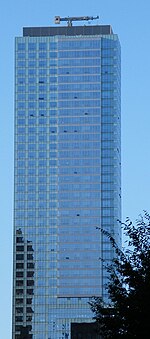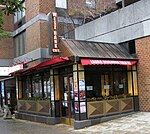330 West 42nd Street

330 West 42nd Street, also the McGraw-Hill Building and formerly the GHI Building, is a skyscraper in the Hell's Kitchen neighborhood of Manhattan in New York City. Designed by Raymond Hood and J. André Fouilhoux in a mixture of the International Style, Art Deco, and Art Moderne styles, the building was constructed from 1930 to 1931 and originally served as the headquarters of McGraw-Hill Companies. The 485-foot-tall (148 m) building contains 33 stories. The building's massing, or shape, consists of numerous setbacks on the 41st and 42nd Street sides, which were included to comply with the 1916 Zoning Resolution. The facade is made of blue-green terracotta ceramic tile panels, alternating with green-metal-framed windows, with a strongly horizontal orientation. The facade was intended to blend in with the sky regardless of the atmospheric condition. The entrance and original lobby were decorated with light blue and dark green panels. Most of the upper stories were similar in floor plan, except for their widths, which varied due to the setbacks on the facade. At the time of its completion, 330 West 42nd Street was controversial for the use of horizontal emphasis on its facade, which its contemporaries lacked. In subsequent decades, architectural critics recognized the building as an early example of the International Style. McGraw-Hill Companies bought the land in early 1930 to replace smaller headquarters; the company originally took three-quarters of the space, renting out the other stories. As 42nd Street declined, the building was more of a liability. McGraw-Hill moved in 1972 to 1221 Avenue of the Americas. The building subsequently served as the headquarters of Group Health Insurance (GHI). Since then, ownership of 330 West 42nd Street has changed several times. In 2021, the building's owner Resolution Real Estate completely renovated the building, including the lobby, to designs by Moed de Armas and Shannon. 330 West 42nd Street was designated a city landmark by the New York City Landmarks Preservation Commission (LPC) and is listed on the National Register of Historic Places (NRHP) as a National Historic Landmark.
Excerpt from the Wikipedia article 330 West 42nd Street (License: CC BY-SA 3.0, Authors, Images).330 West 42nd Street
West 42nd Street, New York Manhattan
Geographical coordinates (GPS) Address External links Nearby Places Show on map
Geographical coordinates (GPS)
| Latitude | Longitude |
|---|---|
| N 40.7575 ° | E -73.991666666667 ° |
Address
McGraw-Hill Building (330 West 42nd Street)
West 42nd Street 330
10036 New York, Manhattan
New York, United States
Open on Google Maps






